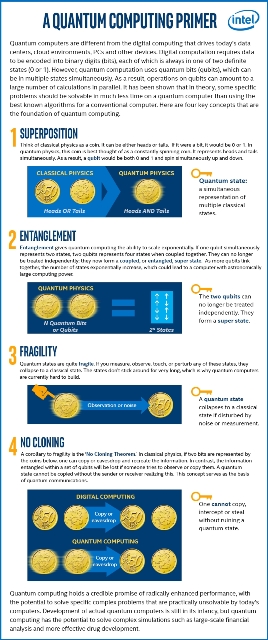Sep 7 2015
Today Intel Corporation announced a 10-year collaborative relationship with the Delft University of Technology and TNO, the Dutch Organisation for Applied Research, to accelerate advancements in quantum computing.
 A Quantum Computing Primer (Graphic: Business Wire)
A Quantum Computing Primer (Graphic: Business Wire)
To achieve this goal, Intel will invest US$50 million and will provide significant engineering resources both on-site and at Intel, as well as technical support.
Quantum computing holds the promise of solving complex problems that are practically insurmountable today, including intricate simulations such as large-scale financial analysis and more effective drug development. Quantum computing is an area of research that Intel has been exploring because it has the potential to augment the capabilities of tomorrow’s high performance computers.
“A fully functioning quantum computer is at least a dozen years away, but the practical and theoretical research efforts we’re announcing today mark an important milestone in the journey to bring it closer to reality,” said Mike Mayberry, Intel vice president and managing director of Intel Labs.
Intel’s goal is to extend the university’s physics expertise and diverse quantum computing research efforts by contributing advanced manufacturing, electronics and architectural expertise.
It believes no one company or organization will succeed alone in unlocking the path to advanced quantum computing. Instead, partnerships – such as this one between Intel and the QuTech institute in Delft – and industry collaboration will help realize the promise of such a technically complex issue.
“Expertise in specialized electronics combined with advanced physics is required to move quantum computing closer to being a reality,” said Mayberry. “While qubit development has been the focus of quantum computing research to date, low-temperature electronics will be required to connect, control and measure multiple qubits, and this is where we can contribute. Our collaboration with QuTech will explore quantum computing breakthroughs that could influence the industry overall.”
“In the next five to 10 years, progress in quantum computing will increasingly require the combination of excellent science with high-level engineering,” said lead scientist Lieven Vandersypen from QuTech. “For the realization of complex circuits containing large numbers of quantum bits, the know-how from the semiconductor industry is essential, and QuTech is thrilled to partner with the leading semiconductor company in the world.”
Intel CEO Brian Krzanich published a blog today explaining the company’s strategic interest in quantum computing, and the relevance of electronics and manufacturing expertise in making quantum computing a reality.